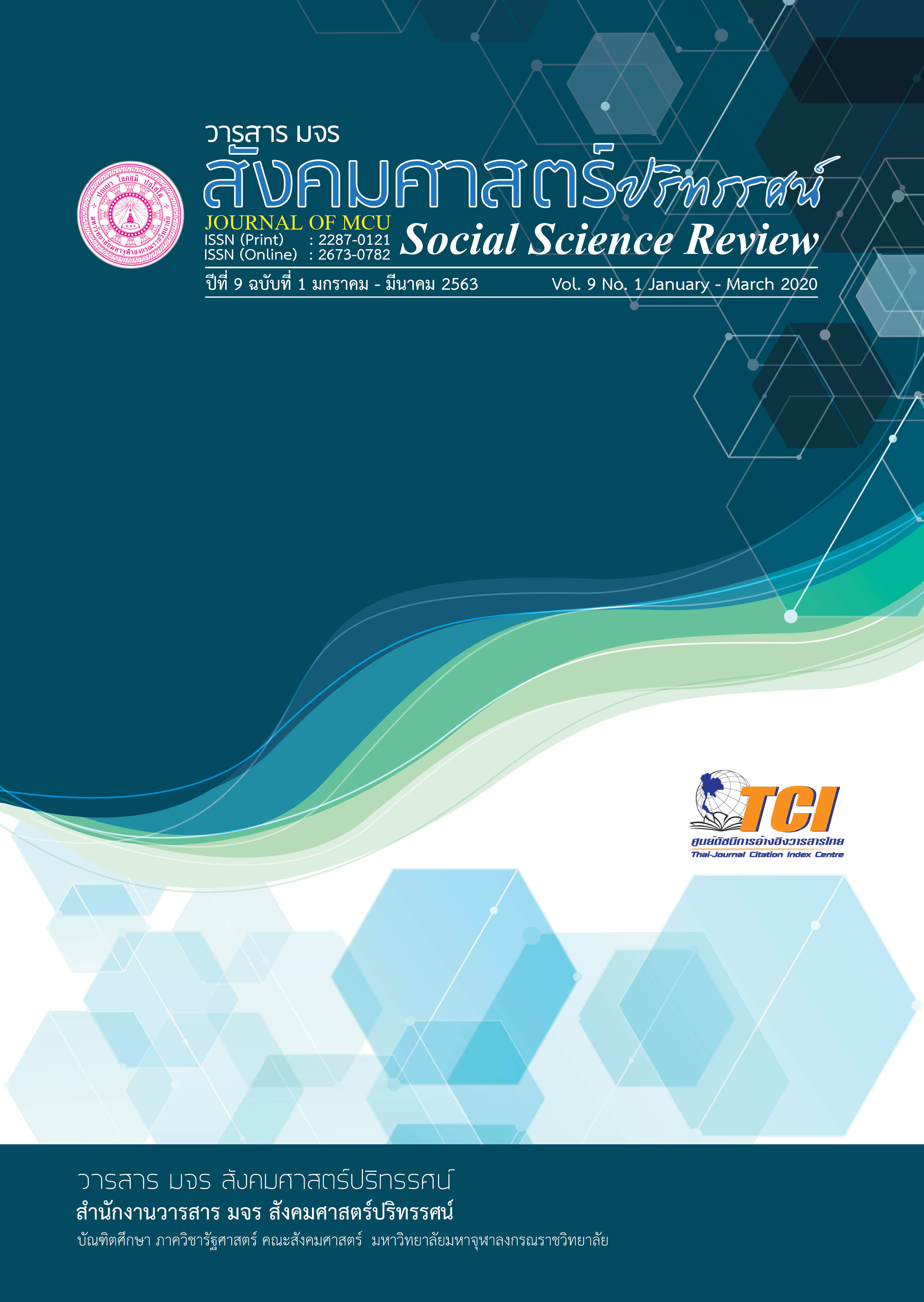การเปรียบเทียบสมรรถนะทางคณิตศาสตร์ระหว่างการจัดกิจกรรมการเรียนรู้โดยใช้ยุทธวิธีเมตาคอกนิชันกับการเรียนรู้แบบร่วมมือด้วยเทคนิค STAD ของนักเรียนชั้นมัธยมศึกษาปีที่ 6 โรงเรียนวังม่วงวิทยาคม
คำสำคัญ:
สมรรถนะทางคณิตศาสตร์, ยุทธวิธีเมตาคอกนิชัน, การเรียนรู้แบบร่วมมือด้วยเทคนิค STADบทคัดย่อ
บทความวิจัยนี้มีวัตถุประสงค์เพื่อเปรียบเทียบสมรรถนะทางคณิตศาสตร์ แต่ละด้านของนักเรียนชั้นมัธยมศึกษาปีที่ 6 หลังจัดกิจกรรมการเรียนรู้คณิตศาสตร์โดยใช้ยุทธวิธีเมตาคอกนิชันกับการเรียนรู้แบบร่วมมือด้วยเทคนิค STAD เป็นการวิจัยกึ่งทดลอง กลุ่มตัวอย่างที่ใช้ในการวิจัย คือ นักเรียนชั้นมัธยมศึกษาปีที่ 6 โรงเรียนวังม่วงวิทยาคม อำเภอวังม่วง จังหวัดสระบุรี ภาคเรียนที่ 1 ปีการศึกษา 2562 จำนวน 2 ห้องเรียน รวม 33 คน ซึ่งได้มาจากการสุ่มแบบแบ่งกลุ่ม เครื่องมือที่ใช้ในการวิจัย คือ แผนการจัดการเรียนรู้ 2 แผนและแบบทดสอบ วิเคราะห์สถิติทดสอบค่าที (t-test) ผลการวิจัยพบว่า ในภาพรวมของสมรรถนะทางคณิตศาสตร์ นักเรียนที่เรียนโดยใช้ยุทธวิธีเมตาคอกนิชัน มีสมรรถนะทางคณิตศาสตร์ หลังเรียนสูงกว่านักเรียนที่เรียนโดยใช้การจัดกิจกรรมการเรียนรู้แบบร่วมมือด้วยเทคนิค STAD อย่างมีนัยสำคัญทางสถิติที่ระดับ 0.05
เอกสารอ้างอิง
กระทรวงศึกษาธิการ. (2551). ตัวชี้วัดและสาระการเรียนรู้คณิตศาสตร์ ตามหลักสูตรแกนกลางการศึกษาขั้นพื้นฐาน พุทธศักราช 2551. กรุงเทพฯ: โรงพิมพ์ชุมนุมสหกรณ์การเกษตรแห่งประเทศไทย จำกัด.
มัณฑนา พรมรักษ์. (2556). ผลของการจัดกิจกรรมการเรียนรู้คณิตศาสตร์โดยใช้โมเดลการแก้ปัญหาที่เน้นกระบวนการกำกับทางปัญญาที่มีต่อความสามารถในการแก้ปัญหาคณิตศาสตร์และความสามารถในการคิดอย่างมีวิจารณญาณของนักเรียนมัธยมศึกษาปีที่ 2 (วิทยานิพนธ์ปริญญาครุศาสตรมหาบัณฑิต สาขาวิชาการศึกษาคณิตศาสตร์). กรุงเทพฯ: จุฬาลงกรณ์มหาวิทยาลัย.
วิมลรัตน์ สุนทรโรจน์. (2551). นวัตกรรมเพื่อการเรียนรู้. มหาสารคาม : ภาควิชาหลักสูตรและการสอนคณะศึกษาศาสตร์ มหาวิทยาลัยมหาสารคาม.
สถาบันส่งเสริมการสอนวิทยาศาสตร์และเทคโนโลยี. (2555). การวัดผลประเมินผลคณิตศาสตร์. กรุงเทพฯ: ซีเอ็ดยูเคชั่น.
สถาบันทดสอบทางการศึกษาแห่งชาติ (องค์การมหาชน). (2562). รายงานผลการทดสอบทางการศึกษาระดับชาติขั้นพื้นฐาน (O-NET) ชั้นมัธยมศึกษาปีที่ 6 ปีการศึกษา2561. สืบค้น 4 ธันวาคม 2562, จาก http://www.newonetresult.niets.or.th/AnnouncementWeb/Login.aspx
สุวิธิดา จรุงเกียรติกุล. (2561). ทักษะการเรียนรู้ในศตวรรษที่ 21. สืบค้น 13 มีนาคม 2561, จาก https://www.trueplookpanya.com/blog/content/66054/-teaartedu-teaart-teaarttea
เสาวณี แก้วสามสี. (2560). การเปรียบเทียบผลสัมฤทธิ์ทางการเรียนและเจตคติต่อวิชาคณิตศาสตร์ เรื่อง สมการเชิงเส้นตัวแปรเดียว ของนักเรียนระดับชั้นมัธยมศึกษาปีที่ 1 ระหว่างการเรียนแบบร่วมมือเทคนิค STAD กับการเรียนแบบปกติ (วิทยานิพนธ์ศึกษาศาสตรมหาบัณฑิต สาขาวิชาหลักสูตรและการสอน). สงขลา: มหาวิทยาลัยหาดใหญ่.
Beyer, B. K. (1997). Improving Student Thinking : A Comprehensive Approach. Boston : Allyn and Bacon.
Jeffrey A.G. et al. (2003). Pretest-Posttest Comparison Group Designs. J. AM. ACAD. Child Adolesc. Psychiatry, 42(4), 500-503.
Man, K. O. (2005). The effect of metacognitive training on the problem solving behavior of primary 6 student (A Thesis of Master of Arts). Hong Kong: The University of Hong Kong.
ดาวน์โหลด
เผยแพร่แล้ว
รูปแบบการอ้างอิง
ฉบับ
ประเภทบทความ
สัญญาอนุญาต
ลิขสิทธิ์ (c) 2020 วารสาร มจร สังคมศาสตร์ปริทรรศน์

อนุญาตภายใต้เงื่อนไข Creative Commons Attribution-NonCommercial-NoDerivatives 4.0 International License.
เพื่อให้เป็นไปตามกฎหมายลิขสิทธิ์ ผู้นิพนธ์ทุกท่านต้องลงลายมือชื่อในแบบฟอร์มใบมอบลิขสิทธิ์บทความให้แก่วารสารฯ พร้อมกับบทความต้นฉบับที่ได้แก้ไขครั้งสุดท้าย นอกจากนี้ ผู้นิพนธ์ทุกท่านต้องยืนยันว่าบทความต้นฉบับที่ส่งมาตีพิมพ์นั้น ได้ส่งมาตีพิมพ์เฉพาะในวารสาร มจร สังคมศาสตร์ปริทรรศน์ เพียงแห่งเดียวเท่านั้น หากมีการใช้ภาพหรือตารางหรือเนื้อหาอื่นๆ ของผู้นิพนธ์อื่นที่ปรากฏในสิ่งตีพิมพ์อื่นมาแล้ว ผู้นิพนธ์ต้องขออนุญาตเจ้าของลิขสิทธิ์ก่อน พร้อมทั้งแสดงหนังสือที่ได้รับการยินยอมต่อบรรณาธิการ ก่อนที่บทความจะได้รับการตีพิมพ์ หากไม่เป็นไปตามข้อกำหนดเบื้องต้น ทางวารสารจะถอดบทความของท่านออกโดยไม่มีข้อยกเว้นใดๆ ทั้งสิ้น





